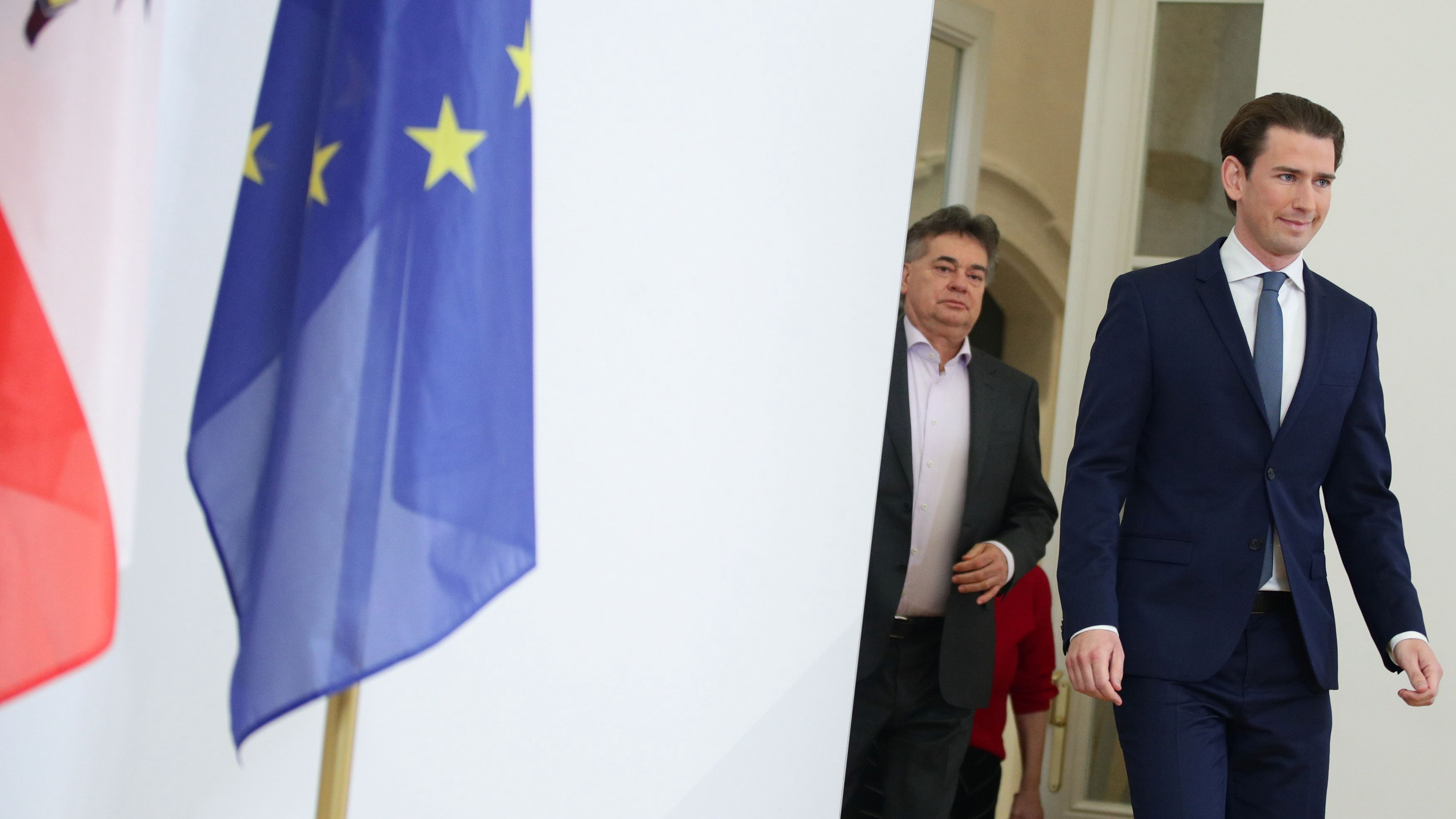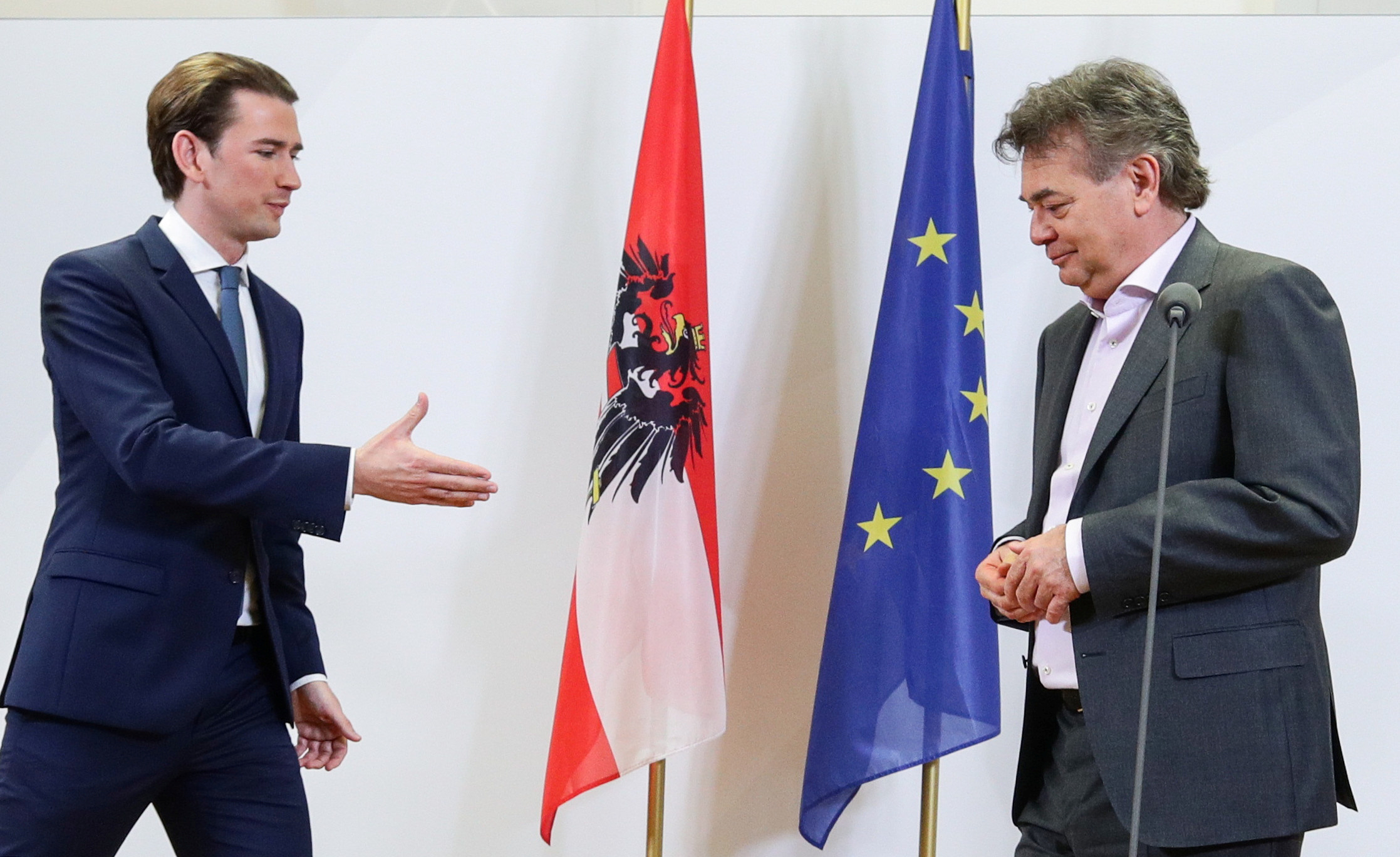
The leaders of the Green Party, Werner Kogler (L), and of the People's Party, Sebastian Kurz (R), arrive at a press conference in Vienna, Austria, January 1, 2020. /Reuters Photo
The leaders of the Green Party, Werner Kogler (L), and of the People's Party, Sebastian Kurz (R), arrive at a press conference in Vienna, Austria, January 1, 2020. /Reuters Photo
New year, new government: Austrian conservatives and environmental Greens announced on Wednesday a coalition deal that will see the Greens enter government for the first time in the country's history, on the back of global concerns over the climate crisis.
The announcement comes three months after snap elections in September resulted in a resounding victory for the conservative People's Party (OeVP), led by 33-year-old political whizz kid Sebastian Kurz, and massive wins for the Greens.
It also marks a new beginning after a year of political upheaval in the small alpine country, marked by the so-called Ibiza scandal and Kurz's ousting from office, replaced by a technocrat government.
Read more:
Austrian conservatives, Greens triumph; far-right suffers debacle
'Enough is enough': Five days of Austria's government collapse
It's a deal
Late Wednesday, OeVP leader Kurz and Green chief Werner Kogler confirmed to the press that their parties had struck a deal after 47 days of coalition negotiations.
The OeVP was the uncontested winner of September elections, handing Kurz the chancellorship again, but whether his party – which made a hard-right turn under him, cracking down on illegal immigration – could come to an agreement with the far more liberal Greens remained in question.
"It is possible to protect the climate, and our borders," Kurz told a joint press conference with Kogler on Wednesday. "We succeeded in combining the best of both worlds."
Kogler, who will join Kurz at the top of the government as vice-chancellor, admitted the two parties were elected on widely divergent platforms but had managed to bridge their differences.
"On environmental protection, we found far more agreement than we might have previously thought. Austria shall become a pioneer in Europe and the world on environmental matters," he said. The two sides also found agreement on tax reforms and social equality, he added.

OeVP leader Sebastian Kurz and the head of Austria's Green Party Werner Kogler shake hands at a press conference in Vienna, Austria, January 1, 2020. /Reuters Photo
OeVP leader Sebastian Kurz and the head of Austria's Green Party Werner Kogler shake hands at a press conference in Vienna, Austria, January 1, 2020. /Reuters Photo
Who's who?
The final list of cabinet ministers as well as a government program are to be made public on Thursday.
According to local media reports however, it looks like the OeVP will be in charge of 10 ministries, including key ones such as interior, defence, integration, finance and foreign affairs, while the Greens will get four portfolios, including justice, social affairs and a broad new "super-ministry" that will include environment, transportation, infrastructure, energy and technology.
Observers have praised the young and gender-balanced cabinet – based on initial reports, it would actually have more women than men.
But there has been muted criticism about the Greens losing out on posts that are dear to their voters' hearts, including education, labor, women's and family affairs, and European policy.
Still, their entry into government represents a remarkable reversal of fortune for a party that for the past two years, wasn't even represented in parliament.
Vindication for Kurz
Kurz's return to the chancellorship also marks a significant comeback, just seven months after he was booted out of office following a no-confidence vote in parliament.
This came after his then coalition partner, the far-right Freedom Party (FPOe), went down in flames over revelations the FPOe leader promised state deals to a supposed Russian agent in exchange for help winning 2017 elections.
On Wednesday, Kurz admitted that 2019 was a "turbulent" year. Kogler said he would make a push for transparency in government.
What next?
Kurz and Kogler are to meet with President Alexander Van der Bellen on Thursday to inform him of their plans.
The ministers' list and government program still need to get the greenlight from both parties on Friday and Saturday.
The new government could then be sworn in next week.